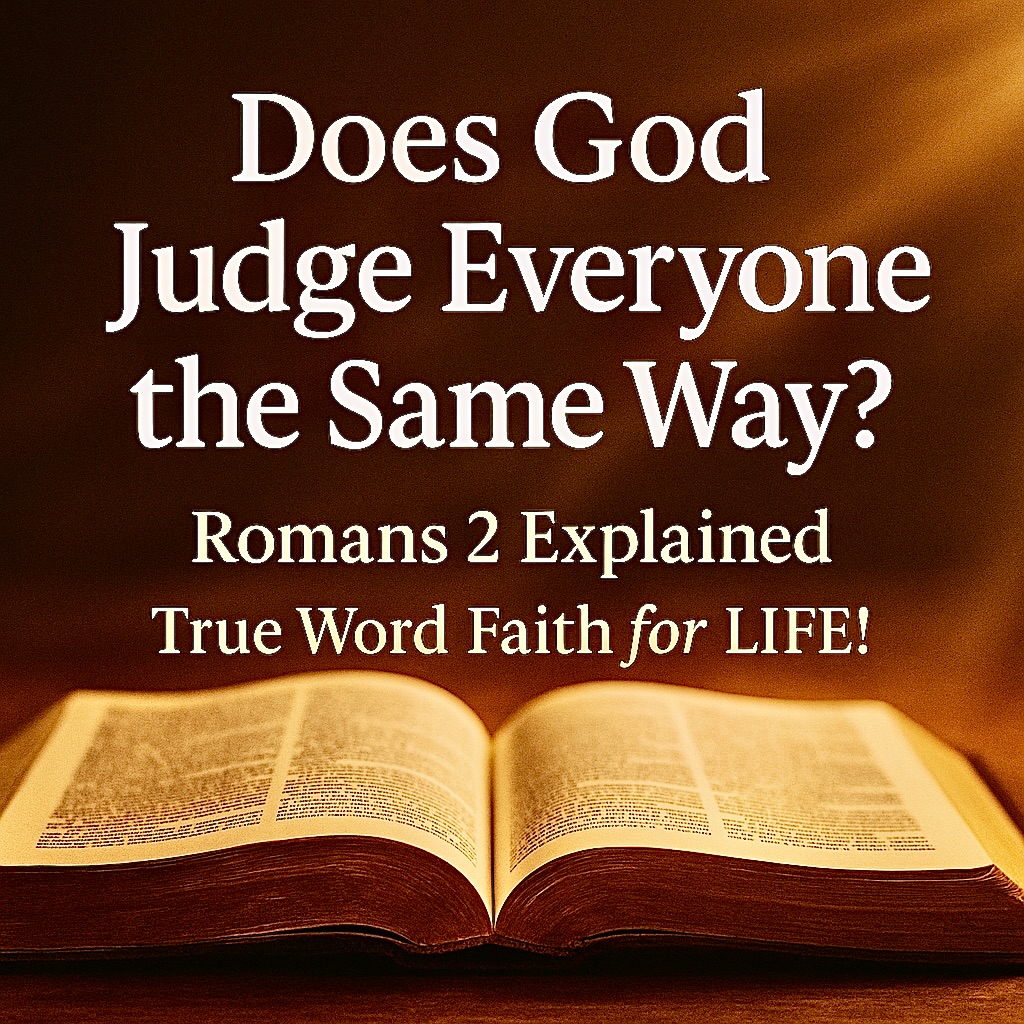What Does Romans 2 REALLY Teach About God’s Justice? | No Favoritism: Jew and Gentile Alike

No Favoritism: Jew and Gentile Alike
Series: Romans: Covenant, Faithfulness, and the Grafted-In Life
What Does Romans 2 REALLY Teach About God’s Justice?
No Favoritism: Jew and Gentile Alike
Series: Romans: Covenant, Faithfulness, and the Grafted-In Life
What if God’s justice isn’t a sliding scale of “better than most”?
What if His standard has always been covenant faithfulness—loyal obedience from a devoted heart?
Romans chapter 2 is where the mirror turns inward. Paul, the rabbi turned apostle, shifts his gaze from the Gentile world’s idolatry to Israel’s hypocrisy. It is as if the courtroom light that exposed the nations now swings around and illuminates the faces of the religious.
No favoritism. No exceptions. No partiality.
The Heart of the Matter
Romans 2 opens with a simple yet devastating truth: “You who judge others do the same things.”
Paul is not speaking to pagans here; he’s talking to those who know the Torah, who recite the Shema, who bear the mark of the covenant. The issue isn’t ignorance—it’s inconsistency.
The Hebrew word mishpat means “justice,” but it also carries the sense of restoring balance and maintaining right order. In the ancient Near Eastern world, kings were measured by how faithfully they upheld justice. And God, the ultimate King, measures His people by the same standard.
That is why judgment in Romans 2 is not about punishment but exposure. It reveals whether we have lived in covenant alignment with the One we claim to serve.
Hearing and Doing
Paul says it plainly: “It is not the hearers of the Law who are righteous before God, but the doers.”
The Hebrew verb shama‘ means both “to hear” and “to obey.”
In God’s economy, listening without doing is disobedience.
We live in an age where sermons are streamed, verses are posted, and theological podcasts fill our playlists. Yet the true test of discipleship remains unchanged: Does our hearing lead to obedience?
If hearing doesn’t produce holiness, we’re just collecting information instead of transformation.
When God Steps Back
The scariest moment in Romans 2 isn’t thunder from heaven—it’s silence.
It’s when God says, “If that’s what you want… I won’t stop you.”
Wrath, as Paul defines it, isn’t rage; it’s release.
It’s God removing His hand of restraint and letting humanity feel the full weight of its rebellion.
It’s what we saw in Pharaoh’s hard heart, in Israel’s wilderness rebellion, in the Judges doing “what was right in their own eyes.”
Wrath is not God losing His temper; wrath is God keeping His word.
The Devoted Heart
Before we go further, think back to Mary of Bethany in Matthew 26. She poured out an entire year’s wages of perfume on Yeshua’s head, and the disciples complained that it could have been sold for the poor. But Jesus defended her act of devotion.
He said, “She has done a good work for Me.”
Word of the Lord, Thanks be to God!
Are you mad at God for not fixing your problem or your heartache or your habit or addiction or for giving you that thing you think you really want? You are mad at Him because you think He’s not valuing you enough to give you that thing you’ve been praying for…. How devoted are you to Yeshua? What have you been willing to give to God that you know know in the natural you can never get back or get again? Mary gave to the Lord what she could never get back. Total devotion. As we move forward in this study, give your devotion not to me, but to Him while you learn.
True covenant faithfulness costs something.
It always has.
When Religion Isn’t Relationship
Paul says that outward circumcision means nothing if the heart remains uncircumcised. In modern terms, God isn’t impressed by religious credentials.
Dr. Michael Heiser once noted, “Paul wasn’t erasing Jewish identity; he was restoring its intent.” That intent has always been transformation from the inside out—obedience born from love, not fear.
Religion can polish the outside.
Only covenant restores the inside.
Pause and Think
Before you scroll further, pause and ask yourself:
Where have I been hearing without doing?
Where have I traded truth for comfort?
I personally read every message sent to me through TrueWordFaithforLife.com, and I’d love to hear how you see Romans 2 speaking into our modern culture.
Challenge and a Choice
Romans 2 removes every illusion of moral superiority.
God does not grade on a curve. He searches hearts, not checklists.
The Challenge:
Where have you relied on your reputation, your theology, or your habits instead of obedience from the heart?
The Choice:
Will you settle for outward religion, or will you surrender to inward transformation—circumcision of the heart by the Spirit of God?
Prayer of Salvation
Heavenly Father, I come to You today with an open and humble heart.
I know that I have sinned and fallen short of Your glory, and I’m asking for Your forgiveness.
Right now, I turn away from my sins and turn fully toward You.
I believe that Jesus, Your Son, is the promised Messiah—that He died for my sins, was buried, and rose again on the third day just as the Bible says.
Today I call on Your holy Name. Please forgive me, cleanse me, and make me new.
Fill me with Your Holy Spirit and write Your truth upon my heart.
From this day forward, I choose to follow Jesus as my Lord, my Redeemer, and my King.
Thank You for loving me, for saving me, and for making me part of Your family forever.
In the name of Jesus Christ, the King of Kings, I pray. Amen.
➡ I am so excited for you because this decision is the most important of your existence!
Contact me through TrueWordFaithforLife.com/contact and I will personally help you along the way.
Share
Before we close today, I want to ask you for one simple favor.
If this post stirred your heart, if it helped you see God’s Word more clearly, or if it challenged you in your walk of faith, please don’t keep it to yourself.
Think of one person who needs encouragement or truth and send this to them right now.
Be that friend who shares light in a world filled with confusion.
And if you’re on social media, post the link and let others know what blessed you.
You never know who might find exactly what they need through your share.
Your share could be the very tool God uses to reach someone with His Word.
If you do NOT want to share this, please email me at smgreener@gmail.com and help me understand why not.
No judgment—just an honest desire to grow and reach more hearts.
Beloved, Romans 2 reminds us that God’s justice is never favoritism; it is faithfulness.
He does not judge by our appearance but by our allegiance.
The same God who exposes hypocrisy offers healing to the humble.
Live with integrity.
Live with humility.
Live with a heart transformed by His Spirit.
This has been True Word, Faith for LIFE! with Dr. Shawn M. Greener.
For more teachings, visit TrueWordFaithforLife.com.
Shalom b’Shem Yeshua.
© 2025 Dr. Shawn M. Greener. All Rights Reserved.
True Word, Faith for LIFE!
Study Guide
Episode 17 – What Does Romans 2 REALLY Teach About God’s Justice?
No Favoritism: Jew and Gentile Alike
Series: Romans: Covenant, Faithfulness, and the Grafted-In Life
Text: Romans 2:1–11
Legacy Standard Bible (LSB) Complete Jewish Bible (CJB)
1 Therefore you have no excuse, O man, everyone of you who judges, for in that which you judge another, you condemn yourself; for you who judge practice the same things. 1 Therefore you have no excuse, whoever you are, passing judgment; for when you judge someone else, you are doing the same things yourself.
2 Now we know that the judgment of God rightly falls upon those who practice such things. 2 We know that God’s judgment lands impartially on those who practice such things.
3 But do you suppose this, O man, when you pass judgment on those who practice such things and do the same yourself, that you will escape the judgment of God? 3 Do you think that you, a mere man passing judgment on others who do such things, yet doing them yourself, will escape the judgment of God?
4 Or do you think lightly of the riches of His kindness and forbearance and patience, not knowing that the kindness of God leads you to repentance? 4 Or perhaps you despise the riches of His kindness, forbearance, and patience, because you don’t realize that God’s kindness is intended to lead you to turn from your sins?
5 But because of your stubbornness and unrepentant heart, you are storing up wrath for yourself in the day of wrath and revelation of the righteous judgment of God, 5 But by your stubbornness, by your unrepentant heart, you are storing up anger for yourself on the day of anger, when God’s righteous judgment will be revealed.
6 who will render to each person according to his deeds: 6 For He will pay back each one according to his deeds.
7 to those who by perseverance in doing good seek for glory and honor and immortality, eternal life; 7 To those who seek glory, honor, and immortality by perseverance in doing good, He will pay back eternal life.
8 but to those who are selfishly ambitious and do not obey the truth, but obey unrighteousness, wrath, and anger. 8 But for those who are self-seeking and do not obey the truth but obey unrighteousness, there will be anger and fury.
9 There will be affliction and distress for every soul of man who does evil, of the Jew first and also of the Greek, 9 Yes, tribulation and anguish will come to every human being who does evil—to the Jew first and also to the Gentile.
10 but glory and honor and peace to everyone who does good, to the Jew first and also to the Greek. 10 But glory, honor, and shalom to everyone who keeps doing what is good—to the Jew first and also to the Gentile.
11 For there is no partiality with God. 11 For God does not show favoritism.
Summary
In Romans 2, Paul exposes the illusion of moral superiority among those who judge others while practicing similar sins. He shifts the focus from the Gentile world’s idolatry to Israel’s hypocrisy, declaring that God’s justice is impartial.
This passage reveals that judgment is not a privilege of the religious but a responsibility of all who live under the covenant. The central issue is not heritage or knowledge but faithfulness—obedience of the heart rather than performance of ritual.
Paul anchors this in covenant logic: those who “hear the Law” but fail to shama‘ (hear and obey) stand under the same judgment as those without the Law. Divine justice is relational and covenantal, not arbitrary. It flows from God’s hesed(faithful love) and emunah (trustworthiness), which demand loyalty and integrity from His people.
Romans 2 levels the ground before the cross, preparing both Jew and Gentile for the revelation of righteousness that comes through faith in Messiah Yeshua.
Key Hebrew and Greek Terms
* מִשְׁפָּט (mishpat) – Justice or Judgment
Rooted in God’s character, mishpat refers not merely to fairness but to the faithful application of covenant order. Divine justice maintains the moral and relational integrity of creation.
* אֱמוּנָה (emunah) – Faithfulness
Often translated as “faith,” this term implies steadfast loyalty and reliability. For Paul, faith is never intellectual assent alone but relational fidelity rooted in trust and obedience.
* חֶסֶד (hesed) – Covenant Love or Loyal Kindness
God’s hesed is His unfailing commitment to the covenant relationship. His justice flows from love, not vengeance, aligning perfectly with His mercy.
* שָׁמַע (shama‘) – To Hear and Obey
In Hebrew, to hear is to respond. The covenant people are not judged by what they know but by whether they shama‘—hear and do.
* Ἀμεροληψία (amerolēpsia) – Partiality
A rare Greek term used in verse 11 meaning “favoritism” or “receiving of faces.” Paul emphasizes that God’s judgment transcends human distinctions, including ethnicity, status, and privilege.
Discussion Questions
1. Paul rebukes those who “judge others but do the same things.” How does this reveal the danger of external religion without inward transformation?
2. In what ways does mishpat (justice) differ from the modern idea of fairness? How does understanding justice as covenant faithfulness change how we view God’s judgment?
3. Romans 2:4 teaches that “the kindness of God leads you to repentance.” How does divine patience serve as both mercy and warning?
4. What does it mean for the Law to be written “on the heart” (Romans 2:15; Jeremiah 31:33)? How is this fulfilled through the work of the Holy Spirit?
5. How can believers today guard against hypocrisy while still speaking truth about sin and righteousness?
Practical Application
1. Covenant Faithfulness Over Comparison
It is easy to compare our sins to others and feel righteous by contrast. But God measures obedience, not appearances. True faith is covenant loyalty that reflects His character in daily life.
2. Hearing That Leads to Doing
To shama‘ is to listen with intent to act. Reading the Bible is not enough; transformation requires obedience. The measure of learning is living.
3. Justice Rooted in Mercy
God’s wrath is not a temper tantrum but the withdrawal of His protective presence. His justice is restorative, aiming to bring us back to alignment with His covenant design.
4. Identity by the Spirit
Circumcision of the heart is a call to live from inward renewal, not outward ritual. The Holy Spirit empowers believers to embody covenant faithfulness.
5. Witness Through Integrity
The world watches how believers respond to truth. Hypocrisy undermines witness; integrity reveals the transforming power of grace.
Key Takeaway
Romans 2 reminds us that God’s justice is relational, impartial, and redemptive. He judges not to destroy but to restore the order of His creation through covenant faithfulness. True obedience is the natural fruit of relationship with Him.
As Dr. Shawn said in the podcast, “Wrath is not God losing His temper. Wrath is God keeping His word.”
When we understand that truth, judgment becomes a mirror rather than a weapon.
Bibliography
1. Heiser, Michael S. The Unseen Realm: Recovering the Supernatural Worldview of the Bible. Bellingham, WA: Lexham Press, 2015.
2. Moen, Skip. Spiritual Restoration: Volume 1 – The Foundations of Hebraic Thought. Orlando, FL: At God’s Table Publishing, 2009.
3. Stern, David H. Complete Jewish Study Bible. Peabody, MA: Hendrickson Publishers, 2016.
4. Legacy Standard Bible. Romans 2:1–11. Irvine, CA: Three Sixteen Publishing, 2021.
5. Wright, N. T. Paul and the Faithfulness of God. Minneapolis, MN: Fortress Press, 2013.
6. Walton, John H., and Brent Sandy. The Lost World of Scripture: Ancient Literary Culture and Biblical Authority.Downers Grove, IL: InterVarsity Press, 2013.
7. Brueggemann, Walter. The Prophetic Imagination. Minneapolis, MN: Fortress Press, 2001.
Shalom b’Shem Yeshua.
© 2025 Dr. Shawn M. Greener. All Rights Reserved. True Word, Faith for LIFE!





